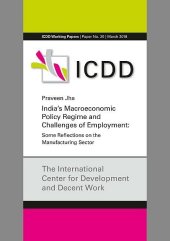 Neuerscheinungen 2018Stand: 2020-02-01 |
Schnellsuche
ISBN/Stichwort/Autor
|
Herderstraße 10
10625 Berlin
Tel.: 030 315 714 16
Fax 030 315 714 14
info@buchspektrum.de |

Praveen Jha
India´s Macroeconomic Policy Regime and Challenges of Employment
Some Reflections on the Manufacturing Sector
2018. 58 S. 29.7 cm
Verlag/Jahr: KASSEL UNIVERSITY PRESS 2018
ISBN: 3-7376-0440-1 (3737604401)
Neue ISBN: 978-3-7376-0440-6 (9783737604406)
Preis und Lieferzeit: Bitte klicken
On would hardly quibble with the view that eradication of poverty and promotion of decent work depends on sustained and inclusive economic growth, and not simply high rates of growth per se. This of course requires necessary intervention on several fronts, in particular adequate macroeconomic space for national governments while being open to equitable multilateral trading systems. Investments in physical and social infrastructure with due emphasis on rural areas, necessary structural reforms, appropriate fiscal and monetary policies and a climate favourable to micro, small and medium enterprises are among the more important elements in a coordinated macroeconomic policy framework that can take the country in the direction of sustainable and inclusive growth.
It is well-acknowledged that the period since the early 1990s has witnessed a fundamental repositioning of the State versus the Market in the Indian economy. Essentially, the transition has been characterized by a strong push towards a policy reform programme, resulting in a very substantial degree of internal and external economic liberalization.
Such a paradigm has been seriously deficient in terms of a whole range of macro-economic interventions required for a growth process which can be inclusive and promote decent work. Sure enough, as per the official figures, the period since the early 1990s clearly shows an acceleration in the trend growth rate compared to the 1980s, but it has been seriously flawed in terms of labour market outcomes. Furthermore, it may not be advisable to see the spurt in growth rates as a decisive transition to a significantly higher growth path.
Among the most worrisome labour market outcomes is the fact that the pace of employment generation has been completely out of tune with the rate of growth of GDP and there has been a significant fall in the elasticity of employment with respect to output. In other words, the key message that gets reinforced by the employment data for almost three decades now is that the transition to a high growth trajectory has not delivered much on the employment front. Moreover, organized manufacturing and services appear to contribute very little additional employment creation, and the expectation that these would add significantly to the generation of employment opportunities once neo-liberal policies succeeded in delivering growth has hardly materialized. On the contrary, there has been a significant dip in the absolute count of the workers in organized segments of the economy. Much of the small increase in employment has been in the categories of casual and self-employment opportunities, which have extremely adverse distributional and social welfare implications. By now it is well acknowledged that most of the important labour market outcomes have shown little improvement during the reform period. Furthermore, deterioration with respect to employment is also reflected in different dimensions of quality such as growing informalization, high incidence of vulnerable self-employment, etc. This paper draws on the relevant secondary sources, including the major data systems, to underscore the argument that there is hardly any strategy to realize adequate and decent employment in contemporary India.


